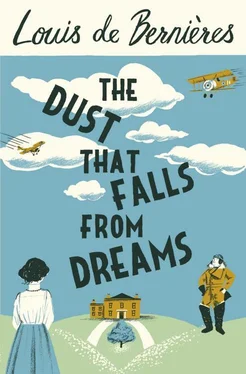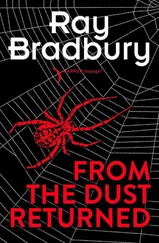‘Known as Chalky and Dusty.’
Hutch shook their hands, and quite suddenly a wave of nausea shot through him, causing him to buckle at the knees. He made a grab for the back of a chair and gasped, ‘Oh, Cookie, I’m not well.’
The two policemen stood up and eased him down into a seat. Cookie ran to the tap to fetch him a drink of water. ‘Thank you,’ he said feebly, as he sipped at it. He set down the glass and put his hands to his temple. ‘My head,’ he complained.
It felt as though his brain were swelling and pulsing inside his skull, and now his back and his arms and legs were beginning to hurt too. ‘I’d better get home,’ he said, and stood up, whereupon he fell unconscious to the floor, folding like a rag doll.
‘Bleedin’ heck,’ said Cookie, kneeling down next to him. She put her hand to his forehead and said, ‘He’s burning up. We’d better get Miss Rosie.’
‘Can’t be us. We’re not supposed to be here,’ said Dusty, so Cookie dashed out, and up the stairs, finding Rosie in the morning room, where, having taken the heavy family Bible from its lectern, she was reading it on her knees at the window seat.
Rosie’s heart sank when she knelt down at Hutchinson’s side and realised immediately what the illness was. It had peaked just at the turn of the month, but hitherto her own family had avoided it by the simple expedient of not going out, apart from Ottilie, who was still down in Brighton nursing her Indian troops. She herself had returned the previous day from Netley, and had not been much exposed.
‘What is it, miss?’ asked Chalky, having forgotten that he and his companion had no particularly good reason for being in the kitchen of the house.
‘Spanish influenza,’ said Rosie, straightening up and trying to think quickly and precisely. ‘Fetch me three tea towels, will you, Cookie?’
She bade the two policemen tie the tea towels across their faces and, then did so herself, saying, ‘It’s probably no use, but it’s better than nothing.’ She knew that if Hutchinson were to sneeze he would fill the air with microbial droplets. The two policemen heaved the body upstairs to the spare room, left their masks there, and then retired to the kitchen to recover their breath and drink another pint of tea. Rosie had told them to wash their hands thoroughly, and now they and Cookie sat in gloom, smelling somewhat carbolical, speculating about the possibly fateful results of their encounter.
‘Mostly gets the very young and the old, don’t it?’ asked Dusty.
‘And the sick,’ said Cookie, ‘and them that’s weak. That’s why it’s got so many soldiers, they’re that wore out.’
‘God help us,’ said Chalky.
When Millicent found out from Cookie that her fiancé was in the house, gravely ill, contradictory emotions of joy and anxiety overwhelmed her. Rosie had decided that she was going to look after the patient on her own and that she and Hutch would both be in strict quarantine. She soaked towels in Lysol and hung them from the walls and from the architrave of the door. She made Millicent stand in the doorway with a muslin cloth across her mouth and nose, and did not permit her to come one step closer. She stood there with her face in her hands, whimpering and repeating, ‘He will be all right, won’t he, miss?’ until Rosie wondered how may more times she was going to have say, ‘I really don’t know, Millicent.’
Mrs McCosh was not pleased. Refusing to wear anything across her face, she positioned herself down the corridor and expected Rosie to have a conversation with her by calling from the doorway.
‘You must get him out straight away and down to an infirmary,’ she instructed her daughter.
‘What infirmary? The Cottage Hospital?’ replied Rosie. ‘You can’t take him into a hospital, he’ll infect the other patients, and a lot of them will die.’
‘But he’s going to kill us all!’ cried Mrs McCosh.
‘Stay away, Mama, and he’ll only kill me.’
‘How can you say such dreadful things? Don’t you mind dying? He’s not even a gentleman. What do you think people will say when they hear you have been immured in a room with a man to whom you are not even related?’
‘He was Ash’s best friend,’ said Rosie, bridling, ‘and I’ve spent the whole war looking after men who weren’t gentlemen.’
‘Heaven knows what it might have done to your morals,’ replied her mother, whereupon Rosie went back into the room and re-emerged with a long-necked Wedgwood vase, which she hurled at her mother with extraordinary force, so that it shattered on the wall, next to her head. As Mrs McCosh looked at her, wide-eyed with astonished outrage, Rosie said coldly, ‘What do you say of the morals of someone who did practically nothing for four years while millions of young men died?’ Then she went back into the sickroom, slamming the door behind her. Mrs McCosh sat down in a chair on the landing and said to herself, ‘But I got a gun after Myrtle was killed. I went to welcome the wounded at Charing Cross. I had Belgian ladies to tea. I took fruit to the Cottage Hospital.’ She would never have dared confront her own mother in such way when she had been young, and now she was quite uncertain as to how to comport herself. It was true that she had greatly provoked her own mother, but now she was helpless in the face of her own angry adult daughter. One thing she knew was that it was no good expecting her husband to take her side. ‘I am quite alone,’ she said, and decided to write to the King.
Rosie sat at Hutch’s bedside, not worrying about whether or not she was going to catch the Spanish influenza. Hutch was almost her last connection with Ash, now that his brothers were also dead, and his parents paralysed by grief. She fetched her madonna from under the bed in her own room, and put it under that of Sergeant Hutchinson, and she brought in her Bible and her prayer book, and the rosary that nobody knew she had, and which she had learned to use from a Roman Catholic missal that she had bought at Westminster Cathedral. Fingering the beads, she repeatedly told the Mother of God that she was blessed amongst women, and her muttering certainly seemed to have a calming effect on her patient.
Hutch was running an extremely high temperature, he was coughing drily in his stupor, and his tongue was coated in a thick grey fur. His eyes and nose were running, and when he awoke it was almost impossible for him to talk, so sore was his throat. Rosie knew that it was quite unrealistic to expect him to eat anything, so she gave him honey from a spoon for his throat, tea and weak vegetable soups, planning to add milk and eggs when he began to recover.
In a hospital, Hutch would have been given mustard baths, but Rosie was not strong enough to carry him to a bath on her own, so she propped him on the side of the bed and made mustard baths for his feet, which he did enjoy when he was lucid. Millicent ran up and down stairs with bowls of freshly boiled water, into which Rosie stirred Friar’s Balsam, so that the air in his room could be kept moist in appeasement of his cough.
For his throat, Rosie made a cold compress of methylated spirit and water, and poultices of linseed for his chest and for the space between his shoulder blades, to relieve the pains. She realised all over again that she actually enjoyed the extreme fatigue of caring for a desperate case. To help him sleep profoundly she gave him a weak solution of potassium bromide, and to his recumbent and sterterous body she read the poems of Rupert Brooke, as if by reading to one of his comrades she could reach Ash’s shade. As he was unconscious, she also read her own poems, and this gave her a strange feeling of excitement and agitation. ‘I should work more at this,’ she thought. ‘This is something I really do want to do.’ She had no idea whether her verses were any good, but it was like a forefinger prodding her in the small of the back. She thought that, even if she were not particularly good at present, she would eventually become so.
Читать дальше












